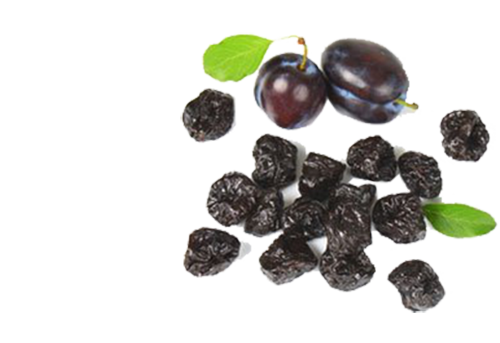NUTRITION & HEALTH
PROPERTIES
Dried fruits are an excellent source of potassium, calcium, iron and provitamin A (beta-carotene) and niacin or B3. Vitamin C, in greater quantity in fresh fruit is lost during desiccation. They constitute a quintessential source of soluble and insoluble fiber, which gives it healthy properties to improve intestinal transit. The use of calcium in these foods is better than that derived from dairy products or other foods that are a good source of that mineral. Dried fruits combine very well with breakfast cereals and enrich it in vitamins, minerals and fiber, which can be an interesting alternative for people of all ages, with the idea of making this first meal of the day, attractive, varied and With new flavors. These foods constitute an ideal restorative complement to the diet and, due to their extra contribution in sugars and calories, are particularly appropriate when long-term sports or intense physical efforts are practiced, so it should always be part of the provisions of mountaineers and hikers Its consumption is discouraged in case of overweight and obesity, since its caloric content is four to six times higher than the fresh fruit of origin, and should be taken into account by people with diabetes and hypertriglyceridemia, due to its concentration in simple sugars. Potassium is necessary for the transmission and generation of the nerve impulse, for normal muscle activity and is involved in the balance of water inside and outside the cell. Beta-carotene is transformed into vitamin A in our body as it needs it. This vitamin is essential for vision, good condition of the skin, hair, mucous membranes, bones and for the proper functioning of the immune system, in addition to having antioxidant properties. Magnesium is related to the functioning of the intestine, nerves and muscles, is part of bones and teeth, improves immunity and has a mild laxative effect. Vitamin B3 or niacin is involved in different phases of metabolism and use of carbohydrates, fatty acids and amino acids among other substances.
FIBER
Its fiber content converts dried fruits into interesting foods in different situations or diseases. Soluble fiber abounds in its composition, which has the ability to form viscous gels that fix fat and cholesterol, thereby decreasing the absorption of these substances; reason why the moderate consumption of dried fruits is positive in case of hypercholesterolemia, if this is not associated with excess weight. Dried plums, in particular, because of their large amount of insoluble fiber, are very effective foods to treat constipation. Insoluble fiber increases the speed of intestinal transit and with it the evacuation of feces (laxative effect); It sequesters bile acids, which are eliminated by feces, which forces the body to synthesize more acids from cholesterol, and as a consequence lowers total cholesterol. Insoluble fiber carries cholesterol and carcinogens; they spend less time in contact with the mucosa, so the risk of hypercholesterolemia and bowel cancer is reduced.NUTRICIONAL VALUE
(Per 100 grams of net weight) Calories: 250 cal.Carbohydrates: 59 gr.
Proteins: 2 gr.
Total Fat: 0,55 gr.
Saturated Fat: 0 gr.
Trans Fat: 0 gr.
Food Fiber: 1,6 gr.
Sodium: 70 mg/kg.



